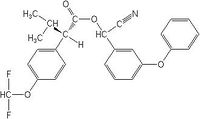Difference between revisions of "Flucythrinate"
| Line 11: | Line 11: | ||
| align="center" bgcolor="#FFFFFF" | [[Image:flucy.JPG|200px|flucy]] | | align="center" bgcolor="#FFFFFF" | [[Image:flucy.JPG|200px|flucy]] | ||
|- | |- | ||
| − | ! bgcolor="#8888FF" | Formula | + | ! bgcolor="#8888FF" | Formula |
|- | |- | ||
| align="center" | C<sub>26</sub>H<sub>23</sub>F<sub>2</sub>NO<sub>4</sub> | | align="center" | C<sub>26</sub>H<sub>23</sub>F<sub>2</sub>NO<sub>4</sub> | ||
Revision as of 11:00, 12 August 2009
Definition of flucythrinate:
Flucythrinate is a pesticide belonging to the group of pyrethroids. It is used to control insects in apples, cabbage, field corn, head lettuce and pears and cotton. Flucythrinate is a dark amber, viscous liquid. [1]
This is the common definition for flucythrinate, other definitions can be discussed in the article
|
Notes
| Flucythrinate |
|---|

|
| Formula |
| C26H23F2NO4 |
The use of this pesticide has been restricted in the US and banned in the European Union since 2003. [2]
It has a low water solubility and a high tendency to adsorb to organic matter and suspended particles. It is therefore mostly associated with soils and sediments. In the soil it is moderately stable, its concentration can be halved in 21 days. It has a low tendency towards bioaccumulate.
Flucythrinate is extremely toxic to fish, which start dying at concentrations above 10 ug/l. Marine mammals and sea birds are much more tolerant to the compound and need to consume several grams per kilogram of body weight to experience effects. Mammals and sea birds are expected to be more tollerant because the seem to be able to excrete flucythrinate more rapidly.
Environmental standards and legislation
Included in the OSPAR list of substances of priority action